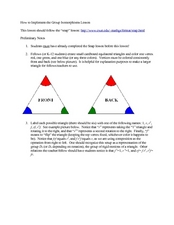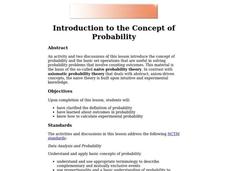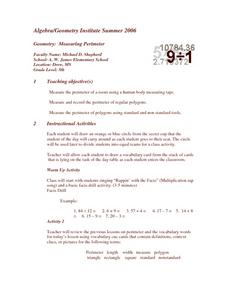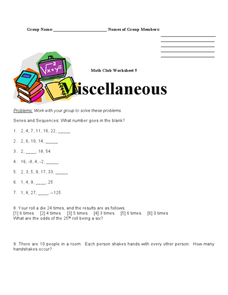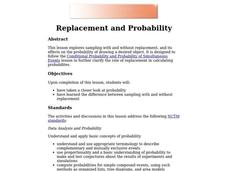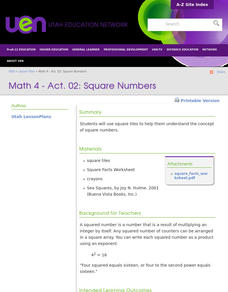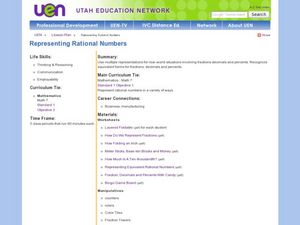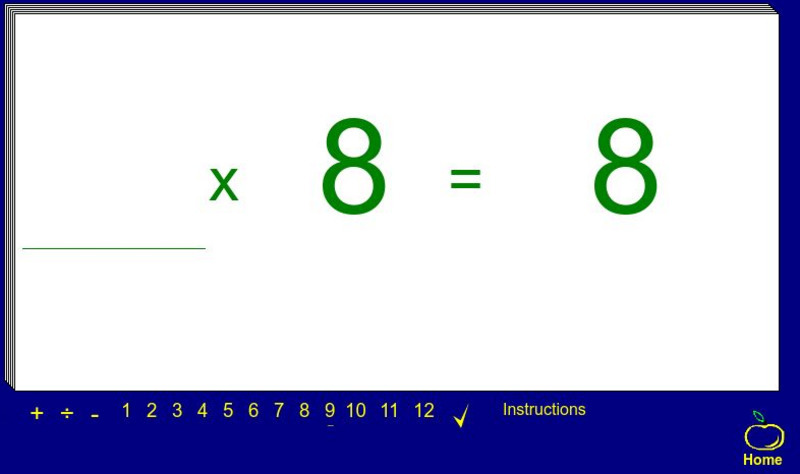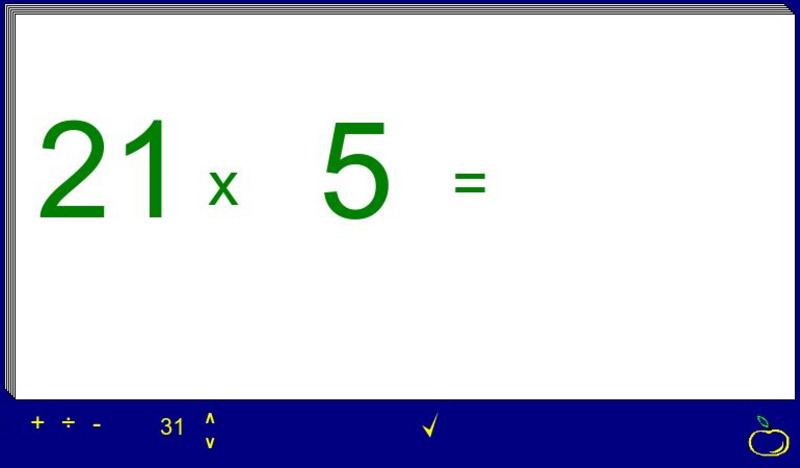Curated OER
Group Isomorphisms
Students identify and apply properties of triangles. In this geometry lesson, students define equilateral triangles by sides and angles. They build cardboard triangles as they study properties of triangles.
Curated OER
Operations with Fractions and Decimals
Complete a lesson that introduces and explores operations with fractions and decimals. Pupils estimate the reasonableness of a decimal computation. Then discuss what operation is needed to find an answer. Handouts, web sources, and other...
Curated OER
Introduction to the Concept of Probability
Middle and high schoolers have a clarified definition of probability, they explore about outcomes in probability and how to calculate experimental probability. They use computers to learn about probability.
Curated OER
Measuring Perimeter
Have your class practice measuring the perimeter of various objects using this resource. Fifth graders place various-sized polygons in order (from largest to smallest). They use non-standard measuring tools to estimate the distance...
Curated OER
Getting to Know Saturn: The Saturn System
Students compare and contrast Earth and Saturn's planet features. In this space science lesson, students draw a diagram of the solar system and identify the different components. They complete a Saturn system scavenger hunt and Venn...
Curated OER
What Are My Chances?
Students calculate probability. In this instructional activity on probability, students use given data to calculate to chances of a given event occurring. Many of the calculations in this instructional activity are applicable to daily life.
Curated OER
Positive and Negative Dominoes
Young scholars play dominoes with regular dominoes rules with some modification. Every student keep score. Every count be used--not just the 5's as in dominoes. They count outside points using white dots as positive and red dots as...
Curated OER
Math Club #5: Miscellaneous
For this math club #5: miscellaneous worksheet, 6th graders work in groups to solve 13 problems requiring logic and problem solving.
Curated OER
Cuisenaire Rods And Math
Students find the least common multiple of several given numbers using Cuisenaire rods. Previously taught math skills are reinforced by using Cuisenaire rod games, puzzles and or activities.
Curated OER
Replacement and Probability
Students explore sampling with and without replacement. They explore the effects on the probability of drawing a desired object. Students examine probability and the difference between sampling with and without replacement.
Curated OER
Using Square Tiles to Investigate Numbers
Fifth graders model and distinguish between prime and composite numbers. Students are paired up with another classmate to complete this lesson. Students are assigned different numbers to work with, they use square tiles to form as many...
Curated OER
Square Numbers
Fourth graders use square tiles to help them explain the concept of square numbers.
Curated OER
Having Fun Working with Fractions
Students participate in various activities that increase their understanding of and ability to solve problems with fractions.
Curated OER
Working with Cuisenaire Rods In Mathematics
Fourth graders learn the numerical value of each underlined letter of the standard Rod Code and develop systematic usage for building new units.
Curated OER
Representing Rational Numbers
Seventh graders explore rational numbers. In this fractions, decimals, and percents lesson, 7th graders identify and compare equivalencies between fractions, decimals, and percents. Students use hands-on activities to investigate the...
Curated OER
Numeric Response Problem
In this square units worksheet, 3rd graders complete word problems about the amount of square units shown. Students complete 10 problems.
Curated OER
Putting Together History Puzzle Pieces
Learners attempt to put puzzle pieces together with no prior knowledge. This activity shows students at the beginning of the year that history is like a puzzle, there are often missing pieces, and many ways the pieces can turn to look...
Math Is Fun
Math Is Fun: Colorable Number Chart
Use this chart to explore counting and number patterns up to 100. Choose from thirty different colors for your paintbrush as well as five different versions of the hundreds chart, or start with a blank chart. There is also an auto color...
Mr. Martini's Classroom
Mr. Martini's Classroom: Negative Number Multiplication Cards, Fill in the Blank
Students type the correct positive or negative number to complete the multiplication problems on these interactive flashcards. The problem changes color when the correct number is typed.
Toy Theater
Toy Theater: Multiplication Chart 1 to 12
Learn multiplication by using this versatile interactive times table grid. Users can find the product of two numbers from 1 through 12, color in rows and columns, and look for patterns throughout the chart.
Shodor Education Foundation
Shodor Interactivate: Coloring Multiples in Pascal's Triangle
In this activity, the student can visually identify number patterns in Pascal's triangle by coloring multiples of a given number.
Mr. Martini's Classroom
Mr. Martini's Classroom: Multiplication Cards, Fill in the Blank
Students solve multiplication facts on these interactive flashcards. The problem changes color when the correct number is typed.
Mr. Martini's Classroom
Mr. Martini's Classroom: Big Number Flashcards: Multiplication Through 31
Interactive flashcards review multiplication of whole numbers through 31. The problems change color when the correct answer is given.
Mr. Martini's Classroom
Mr. Martini's Classroom: Inequalities: Multiplication and Division
Learners multiply or divide two numbers to solve the inequalities on these interactive flashcards. The problem changes color when the correct symbol is chosen.


